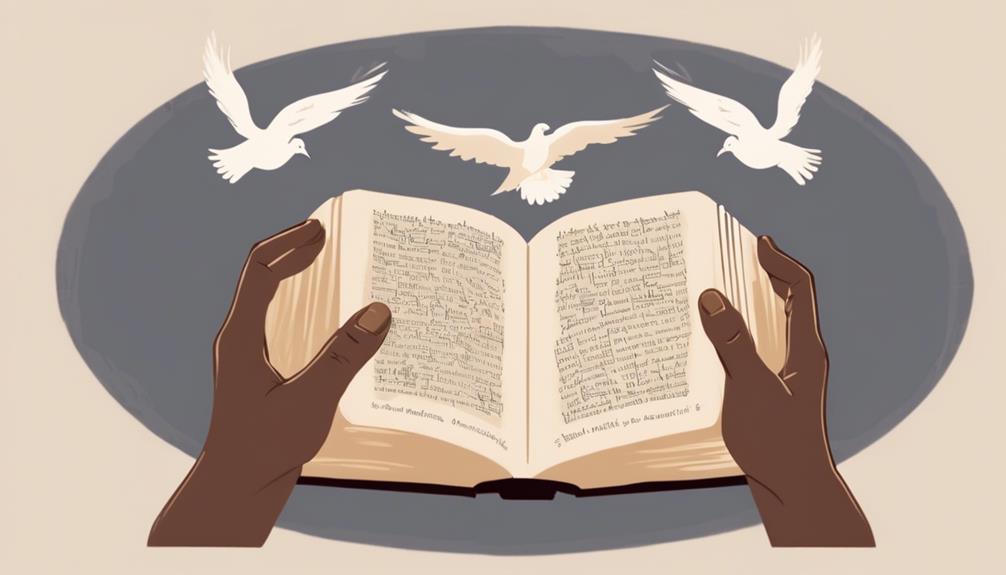Immerse yourself in the transformative power of biblical Prayer of Agreement and discover its profound impact on modern spirituality.

Prayer of Agreement in the Bible
You might think the concept of the prayer of agreement is too esoteric or outdated for today's world, but it's deeply rooted in the Bible and more relevant than you might realize.
This powerful form of prayer, where two or more come together in unity to ask for a specific outcome, has biblical foundations that can transform modern spiritual practices.
As we explore its significance, from ancient texts to personal testimonies and its application in today's context, you'll discover a renewed perspective on communal prayer and its potential to bring about significant change.
The intriguing part lies in how this ancient practice fits into our contemporary lives, offering a bridge between the past and present spiritual practices.
Key Takeaways
- The Prayer of Agreement is deeply rooted in biblical teachings, demonstrating God's responsiveness to collective faith.
- It challenges individualistic approaches, emphasizing unity and shared purpose within a community of believers.
- Scriptural references throughout the Bible illustrate the power and significance of engaging in collective prayer.
- Modern applications show its relevance in addressing contemporary issues, fostering spiritual solidarity and inclusivity among believers.
Understanding the Concept

To grasp the concept of the prayer of agreement, it's essential to understand its roots in biblical teachings and its implications for communal faith practices. Delving into the historical context, you'll find that this concept isn't a standalone notion. Instead, it's deeply intertwined with the fabric of communal worship and shared belief systems. The practice has evolved over centuries, shaped by theological debates that have questioned the power and efficacy of collective prayer.
Analyzing these debates, you'll discover a spectrum of perspectives. Some theologians argue that the prayer of agreement amplifies the faith of individuals, creating a stronger plea to the divine. Others contend that its power lies not in the volume of prayers but in the unity and sincerity of the hearts involved. This divergence in understanding points to the complexity of interpreting biblical concepts and their application in modern faith communities.
What's clear, however, is that the prayer of agreement calls for a deep sense of community and shared purpose. It's not merely about agreeing to pray; it's about aligning hearts and minds towards a common goal, rooted in faith and mutual support. This communal aspect is what sets it apart, making it a unique expression of collective spirituality.
Biblical Foundations
Examining the biblical foundations of the prayer of agreement reveals a rich tapestry of scriptural references that underscore its significance in communal faith practices. This analysis not only highlights its deep historical context but also unpacks the theological implications woven throughout the narrative of scripture. You'll find that the concept isn't merely an isolated practice but is deeply embedded within the fabric of biblical history, reflecting a profound understanding of communal interaction with the divine.
The historical context of the prayer of agreement is pivotal, illustrating how early believers relied on collective prayer during times of decision-making, supplication, and worship. This practice wasn't just about communal unity; it was a theological statement about the nature of God's responsiveness to collective faith. By engaging in this form of prayer, believers demonstrated their understanding of God as not only a personal deity but also one deeply concerned with the collective well-being of His people.
The theological implications are equally significant. They suggest that the prayer of agreement is more than a ritual; it's a manifestation of faith that underscores the power of collective petitioning. Through this lens, you see a theology that values community, interdependence, and the collective pursuit of God's will. This perspective challenges individualistic approaches to faith, encouraging a more communal and interconnected spirituality.
Modern Applications

In the contemporary context, the prayer of agreement retains its relevance, adapting to modern challenges while fostering spiritual unity among believers. This adaptation is evident in its alignment with current cultural relevance, ensuring its practice remains impactful in today's diverse societal fabric. The incorporation of technology integration into this age-old tradition exemplifies how the prayer of agreement has evolved, bridging geographical divides and allowing for a more inclusive participation.
You'll find that technology, particularly social media and communication apps, plays a pivotal role in the modern application of the prayer of agreement. These platforms facilitate the gathering of believers from various backgrounds, transcending traditional barriers such as distance and time zones. Through these digital channels, prayer requests are shared, and collective prayer sessions are organized, demonstrating a seamless blend of faith and modernity.
Moreover, the cultural relevance of the prayer of agreement today is reflected in its ability to address contemporary issues. Believers unite in prayer over global crises, social injustices, and personal challenges, showcasing the timeless essence of communal prayer in fostering hope and resilience.
In essence, the prayer of agreement's modern applications, through technology integration and cultural relevance, underscore its enduring significance in fostering spiritual solidarity among believers facing the complexities of the 21st century.
Personal Testimonies
Building on the modern applications of the prayer of agreement, let's explore personal testimonies to understand its impact on individual believers. You'll find that these stories aren't just emotional recounts but are deeply embedded with cultural influences that shape the practice and perception of this form of prayer. The emotional impacts, for instance, often reflect a shared sense of community and belonging, underscoring the powerful role that collective faith plays in personal experiences.
Analyzing these testimonies, you'll notice patterns that highlight how cultural backgrounds influence the understanding and execution of agreement prayer. Whether it's the emphasis on communal gatherings in collectivist societies or the preference for more private, intimate prayer settings in individualistic cultures, these nuances are critical. They not only affect the approach but also the perceived efficacy of prayer in the lives of believers.
Furthermore, the emotional resonance of these testimonies can't be overlooked. They offer insight into how the prayer of agreement can serve as a source of comfort and strength, fostering a sense of emotional well-being and community support. This dual impact, both cultural and emotional, enriches our comprehension of the prayer of agreement's role in the spiritual lives of individuals, illustrating its significance beyond mere religious practice.
Engaging in Agreement Prayer

How do you actively engage in agreement prayer, and what steps can ensure its effectiveness in your spiritual journey? Engaging in agreement prayer necessitates a conscious effort to align spiritually with others, fostering a collective atmosphere where group dynamics enhance the prayer's power. The first step involves identifying individuals who share a similar spiritual alignment, ensuring the group's intentions are unified. This unity is critical, as it amplifies the prayer's intensity and focus.
Step |
Action |
Outcome |
|---|---|---|
1 |
Identify spiritually aligned individuals |
Establishes a unified foundation |
2 |
Set a clear, mutual intention |
Ensures focus and purpose |
3 |
Pray with openness and receptivity |
Facilitates spiritual connection |
Methodically approaching agreement prayer by following these steps can significantly enhance its effectiveness. It's essential to maintain an open and receptive attitude throughout the process, allowing for a genuine connection both to the divine and among the group members. This connection is what ultimately empowers the prayer, guided by the principle that where two or three are gathered in agreement, their request is more potent. Understanding and applying these principles will enhance your spiritual journey, offering deeper insights into the dynamics of communal prayer and spiritual alignment.
Frequently Asked Questions
How Does the Prayer of Agreement Differ From Intercessory Prayer in Terms of Spiritual Impact and Effectiveness?
You're exploring the distinction between two prayer dynamics, focusing on their spiritual impact and effectiveness.
The prayer of agreement leverages spiritual unity among believers, amplifying its effectiveness through collective faith.
In contrast, intercessory prayer involves an individual advocating or intervening on behalf of another, relying more on personal faith and spiritual discipline.
Both practices hold power, but their effectiveness varies based on the unity and faith of those involved.
Are There Any Historical Records or Examples Outside of the Bible That Demonstrate the Practice of the Prayer of Agreement in Early Christian Communities?
You're looking for historical evidence of group prayer practices in early Christian communities, specifically regarding early martyrs and community rituals.
While direct records are scarce, writings from Church Fathers and accounts of early martyrs hint at communal prayer rituals, suggesting a form of prayer agreement. These practices were pivotal for maintaining faith and solidarity, especially during persecution.
In the Context of Differing Denominational Beliefs, How Is the Prayer of Agreement Viewed or Practiced Differently Among Various Christian Traditions?
You're exploring how diverse Christian traditions, each with their own set of beliefs, embrace or adapt the practice of collective supplication. Denominational interpretations significantly influence how this tradition is observed, reflecting varying theological nuances.
Moreover, ecumenical practices offer a unique lens, showcasing how shared spiritual exercises can bridge doctrinal divides. Through a scholarly and methodical analysis, it's clear that understanding these differences requires a deep dive into the subtleties of faith expressions.
What Psychological Benefits, if Any, Might Individuals Experience From Participating in Agreement Prayer, According to Contemporary Psychological Studies?
When engaging in group activities like agreement prayer, you might find yourself experiencing increased social bonding and mental resilience.
Contemporary psychological studies suggest these benefits stem from the communal aspects of the activity, fostering a sense of unity and support.
This shared experience can buffer against stress, enhancing your well-being. Essentially, the act of coming together in agreement offers psychological advantages, reinforcing your social connections and emotional strength.
Can the Prayer of Agreement Be Practiced With Someone of a Different Faith, and if So, How Does This Impact the Prayer's Effectiveness or Theological Implications?
You're wondering if engaging in a prayer of agreement across faiths affects its effectiveness or theological stance. This venture into interfaith dialogue and spiritual syncretism can enrich your spiritual practices, blending insights and enhancing mutual understanding.
However, it's crucial to analyze how this approach influences theological implications, potentially challenging traditional views. The effectiveness of such prayers may depend on the participants' openness and respect for each other's beliefs.
Conclusion
In conclusion, have you not seen how deeply the prayer of agreement roots itself in biblical teachings and extends into our modern spiritual practices?
Analyzing scripture reveals its foundational importance, while personal testimonies and contemporary applications underscore its transformative power.
Engaging in agreement prayer isn't merely a tradition; it's a methodical approach to unlocking collective faith's potential.
Thus, embracing this practice can significantly enhance one's spiritual journey, fostering unity and manifesting divine promises through shared belief.



Sign up